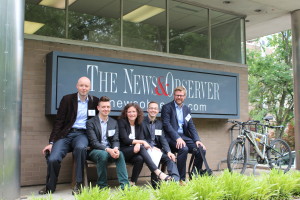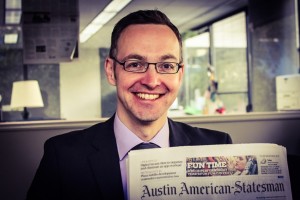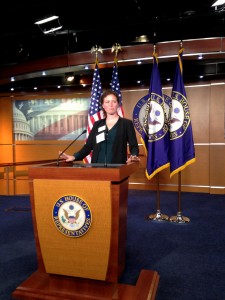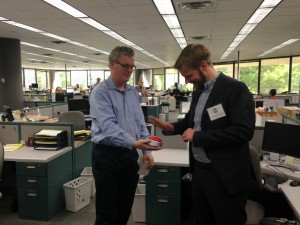
The world if fast shrinking and nowadays, local news is global news. Humans have become a species of globetrotters and seeking to explore new horizons and visit every corner of this Earth. At the same time we are also very local and want to know first what is going on in our own backyards or in our hometowns. Newspapers around the world and in the United States in particular have had to re-learn how to become more local while at the same time learning how to adapt and survive in this highly competitive digital revolution.In May of this year, Meridian organized a program for five German journalists from leading regional papers designed to expose them to the transformation of print media in the United States. The program, titled “Regional and Local Reporting in a Global Information Age” was funded directly by U.S. Embassy in Berlin, Germany and was the second project in a series of four programs.
For me, this was one of those rare instances when I was able to not only organize their program in the United States, but at the same time be able to travel with the delegation for their national program in Raleigh, North Carolina and Austin, Texas. It allowed me to better interact with the participants (and they were indeed a great bunch) and also to be reminded of the finer dynamics of programming such a complex visit.
The measure of success for this project and other similar projects as well is not the number of meetings the delegation has, nor the number of contacts they make, nor even the number of people they meet. What really matters is what they take away. Since this group was one of journalists, which by definition are not only observant and inquisitive but also good at expressing themselves, I asked them to share with me and with Meridian’s broader audience in general what it means to be a participant in one of these exchanges, what they learned, what was unexpected, and what they took away from this experience. Their unfiltered thoughts are included below.
Ronny Strobel

It’s my first time in the United States – and I didn’t come here with specific expectations. With good reason. Expectations usually restrict your view of things, because you already think in a certain direction – and that’s what I wanted least.What I discovered was a land of openness and receptivity to other cultures, countries and people of other origins, which unfortunately I often miss in my home. The many contacts over the past few days made it obvious to me how much the States do benefit from their diversity and the different influences – be it in terms of creativity, pace or pragmatism of getting things done. Whenever there is a problem, people usually first think of opportunities. The fear of failure in my home country is more pronounced than in the United States – and that too often paralyzes.
I’m not sure if this is because the States, in their sheer size, provide more opportunities and as a result people face challenges with a particular form of confidence. So this impulse I take back home: you can make the change, just start doing so. Think good and don’t hesitate to go through with things once you have decided. And if it goes wrong, it is not the end but the beginning of something new.
Carina Lechner

How does media in the United States cope with the shift from print to online? An essential question for me as a German journalist, whose publishing house faces the same challenge. And my expectations on the answer had been huge, because U.S. media are often said to be one step ahead. The program “Regional and Local Reporting in a Global Information Age” gave me the chance to get behind the scenes and in the newsrooms, meet political experts, journalistic scientists, reporters, publishers, bloggers. We squeezed them all, they did their very best to satisfy our curiosity, but my personal summary is: I didn’t get the recipe how high quality journalism can make it through the crisis. Why? Well, the program itself was perfect (as was the organization by Bogdan Banu from the Meridian International Center, Washington, DC). The mixture of persons we got in contact with represented the widest possible range of media. The famous Washington Post, the small News & Observer, progressive Blogs like “Burnt Orange Report”, the very successful website Texas Tribune who gives the old-established newspapers in Austin shivers (like TV-Senders with innovative technologies do by the way). And it was awesome and a great honor how much time those busy people spent with us! That is not the point, why I didn’t have a short answer to bring back home. The point is that there is no across-the-board-recipe. But I got to know a lot of creative instruments, how the shift may work at least better. Fantastic micro-local video-projects, innovative organization of newsroom-intern communication – and the journalists’ bright openness of mind to follow a new rhythm of journalism and to use social media, no matter which generation. I thank you for the great experience.
Jan Peter Kern
Big, bigger – USA. Everything is supersized. That’s what I’ve always thought about the United States, though I’ve never been there before. Big burgers, big cars, big buildings.

And yes, that’s right: at least Texas is even much bigger than Germany, no, it’s twice as large. We’ve been there! “Big” normally means: many people and anonymity. Would anyone care for another in such a supersized surrounding? This thought proved wrong. When you buy coffee (damn, you can find Starbucks everywhere!) you have to talk first. Small talk. “How are you?,” “Oh, your hair looks great!” Et cetera, et cetera, et cetera. In small Germany you get your coffee much faster since no one cares about your hair and how you’re doing. You order coffee, you pay (without credit card!), you get the coffee – no one talks until you say “Thank you” and leave. That’s it. No small talk. Germans are much more reserved. The contrast struck me: the American openness was something I didn’t expect. And I don’t care whether the interest in my condition was superficial — it really meant something to me. And concerning life, work and leisure time: Americans are much closer to Germans than many people would probably think.
Michael Krechting
When I heard about the purpose of the reporting tour to the United States, I immediately remembered the moment when I first clicked this video: http://vimeo.com/3390739
“Sad, so sad”: This is what I felt when I saw the video. Sad, because The Rocky Mountain News walked away. A newspaper died. I’m kind of addicted to newspapers (and nowadays to their digital editions) since I was 14, 15-years-old. But in 2009, this video caused some sort of panic in me, although I had never read this newspaper and had never been in Colorado. The video made the newspaper crisis in the United States very tangible. And it made me think: Okay, I’m not living in the United States, but I’m a journalist, and if this is the threat, we journalists all have to push ourselves even harder into the transition to digital.

Preparing for the trip to the United States several weeks ago, I saw the video again. What really impressed me, was one sentence. At one point in the video, the former editor of the newspaper says: “There has always been an attitude of let’s embrace opportunity, and let’s embrace change.” That made my curious. What is this that lets journalists in the United States, although they have to face all these problems, still embrace opportunities? Is it an attitude thing? A question of how newsrooms are organized in the United States? A question of innovation management? Or what else?
I got some answers during the ten days we spent in Washington, DC, Raleigh and Austin. And, of course, I took some new questions back to Germany. What made this reporting tour such a special and valuable experience, is the fact that you meet so many different people. Everywhere we went, people took their time, shared their thoughts and discussed with us. Everyone was incredibly friendly. This is why I want to say thank you to everyone I met during our appointments. And of course also to Bogdan, Tai and all the folks at Meridian, The Global Austin, International Focus, the U.S. Embassy in Berlin and the Consulate General in Dusseldorf who made this travel possible.
















